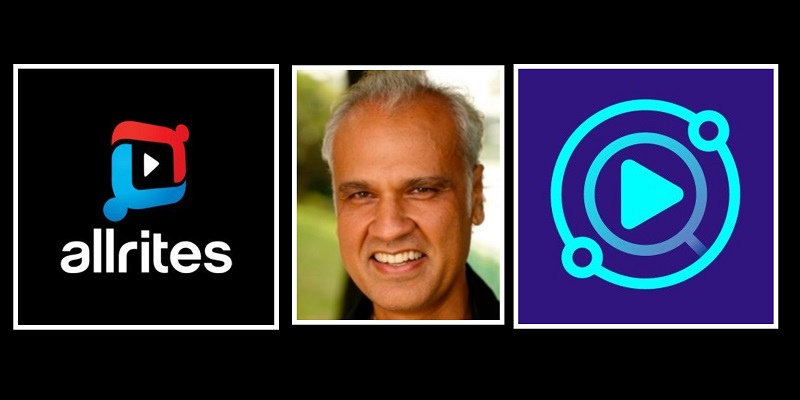
If content is the king, the right strategies, marketing and its distribution mechanism are definitely the king-maker. The founder and CEO of allrites and ritestream Riaz Mehta has been working hard to revolutionise content licensing and distribution ecosystem. Through his platforms and other efforts, he is paving the way forward where the business is conducted with transparency.
His company allrites is a unique B2B global digital marketplace where customers can discover, buy, and sell film, television and sporting content rights. The platform re-imagines the traditional content licensing model. Their mission is to democratise content and maximise the revenue potential for content beyond what is possible by traditional content distribution methods.
It is home to over 100,000 hours of diverse content and has 7,000 active users worldwide. Buyers and sellers can share and cultivate material across a broad spectrum of genres, languages, geographical regions and formats. Licensing options include SVOD, AVOD, linear digital and fast channels, connected television, cable, over-the-air, and even the metaverse.
On the other hand, ritestream is another positive disruptor in the field, and is a launchpad for film, television and blockchain technology that consists of an innovative streaming app. Designed specifically for content lovers and creators, the platform enables users to earn digital currencies as they watch, while creators have the power to fund their television and film projects by earning tokens. The technology works to democratise the antiquated systems currently dominating the streaming and finance sectors.
In an exclusive chat with Animation Xpress, Mehta shared about his journey as a serial entrepreneur and an established TV producer. He expounded upon the ‘lack of evolution’ in the content licensing and distribution ecosystem that he witnessed and how he went on to establish two of his companies to tackle these issues.
“I pivoted my career to follow my passion which was creating shows effectively, and I self taught myself how to be a TV producer. I went on to create a number of reality TV shows over the years, worked with some of the best producers in the US like Mark Burnett, licensing their formats into Asia, and then went on to create my own format, got nominated for Emmy awards and I have done numerous things. But in that journey, I realized the challenges faced by producers both in terms of creating content and monetising the content. And the first thing I started doing was solving the monetisation issue,” said Mehta.
The multifaceted businessman had earned a Bachelor of Science Degree, specialising in Computer Science and Software Development from Macquarie University in Sydney, Australia. Prior to answer his creative calling he worked as a software developer.
In 2017 he founded allrites as a direct response to the inequalities and a lack of evolution in the media streaming ecosystem, and in 2019, brought Damian Miles on board as co-founder and CTO.
He explained that on his platform, instead of paying all the money upfront for 100 movies, and having 20 different contracts, you read a single contract, and you are basically paying a fixed amount every month, so you reduce the capital outlay. And the second thing is that the platform gives you flexibility to change that content on a month by month basis, so that you are not stuck with the long term license. If the content isn’t performing on your platform, then you can switch it out and put something else.
Elaborating about the business model where they have simply taken the traditional distribution model and placed it on to a tech platform, Mehta said, “The business model is built around consumer behaviors, and really fundamentally transforming the content licensing model. And what this does, even for the creators is, instead of them waiting for that one big deal to happen that may take months or years sometimes and the payments don’t come for a long time, now they get monthly recurring revenues, so they can monetise the entire catalog. And we have a network of buyers across the globe. Whenever content gets selected, they start generating revenue. And they have full transparency in terms of where the content has been utilised. And it’s not a revenue share model; they know exactly how much they are going to get.”
He believes this is a true transformation for the industry. Also, this is the way forward as it basically solves the content monetisation angle.
On the Web3 front they are creating a launchpad for film and TV content. They are trying to solve the problem of the creators who have to go to a broadcaster or a studio or an investor and then they give up a lot of their rights, and end up losing creative control.
In the last few years, they started building this marketplace to empower the creators and many have already joined the space. They are now able to migrate that pool of traders into the rightstream ecosystem whereby they can really monetise, create their ideas and get support from the community. Mehta mentioned that they already have around 3,000 creators on the platform.
The B2B platforms are taking up some new projects and helping them to build NFTs, monetise them and also exploring Metaverse rights.
A first for the industry, allrites content will soon be available in the impending launch of Planet Theta, the world’s first virtual reality dating app – allowing couples to date from the comfort of their own home, utilising Oculus/Steam VR headsets.
“CryptoKnights is basically my creation and it’s a way for me to connect Web2 audiences with Web3 and to make crypto mainstream. I’ve been in crypto since 2013. I’ve been watching this space and dabbling in this space for a long time. CryptoKnights has been effectively a format like Shark Tank. We will have entrepreneurs come, pitch their ideas to the OGs of the crypto industry and they will not only get funding but will also get mentoring and support and they can get listed on an exchange,” he said.
Asked about ensuring the security, Mehta said, “We have got legal advice on that front. So in the case of NFTs, we have a reward system so that when you own these NFTs, you will earn various rewards but they’re not directly linked to revenues.”
People gradually are trying to understand this space. But there is still confusion between Metaverse, Web3, NFTs and so on.
“Everybody is living like nothing has changed. Like when I came to this market (MIPCOM), I saw that people are going about doing business exactly the same way they’ve done for years and years. They don’t know what this massive opportunity is. Imagine, once you start exploring content in the metaverse, there are no restrictions; there are no limitations on what you can achieve. And you have access to a global audience instantly. That is a huge opportunity that a lot of creators, studios don’t quite understand. And we are going through a process where we are talking to a number of major studios to acquire the content with Metaverse rights,” Mehta pointed out.
For the metaverse, they are also talking to some of the major Hollywood studios.
Regarding the openness or receptivity of people while exploring this medium, he said, “I have found that they’re surprisingly open and in a pleasant way. Initially their reaction is ‘okay, what is it and how does it all work?’. Once we explain it to them and tell them that there is no real downside for them to actually participate in this and experiment with it, they kind of go ‘okay, how about we try for these titles? Let us move forward with something.’ So right now we have probably got a collection of more than 100 movies.”
The entrepreneur who is passionate about content and its marketing tried defining what is metaverse and other terms that people confuse it with.
“Metaverse is basically a virtual world where you can experience life in a different way, right? We have more freedom. And in a sense as an avatar, you have freedom to be whoever you want to be. And also to be able to connect with your friends with people you want to meet. At the same time it is a safe environment because it’s an environment that you can dip into and you can get out of as well, at your convenience. If I want to catch up with my best friend in Australia, I could go into the metaverse, into a virtual city anywhere in the world, take a walking tour or walk into a cinema and have that dialogue with that person and have that experience. I think as technology evolves, the experiences will become more and more real.”
According to Mehta, Web3 is a true digitisation. Through decentralisation the way business is conducted will be transparent. And it becomes more of a gig economy as well because of the transparency and it will help people develop new business models that don’t exist today.
As he is creating a 360 degree ecosystem for the content industry so we were wondering if his tech-based marketplace can probably compete with MIPCOM down the line.
“I wouldn’t say that. But yes, I can totally foresee a market like this happening whereby you will be able to interact with people, be able to pitch your ideas, and have your ideas funded as well,” he concluded.



